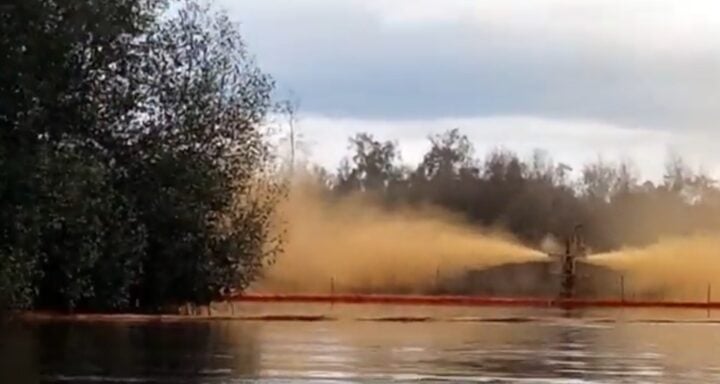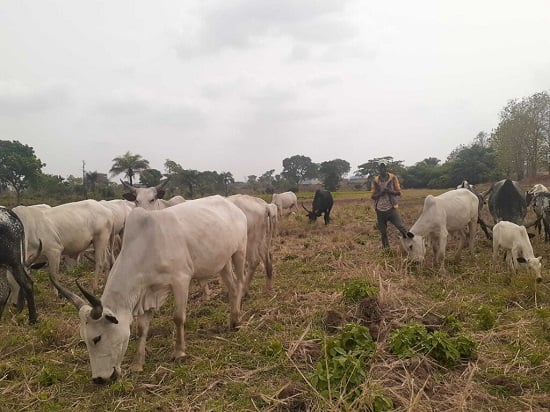Oil spill in Niger Delta
BY NNIMMO BASSEY
Welcome words at Niger Delta Alternatives Convergence (NDAC) held on 12th May 2025 at Yenagoa, Bayelsa State, Nigeria, by Nnimmo Bassey, Director of Health of Mother Earth Foundation
We remind ourselves that genocide is an international crime under the Rome Statutes and is defined as “the deliberate and systemic destruction of a group of people because of their ethnicity, nationality, religion, or race” (Encyclopaedia Britannica). The report of the Bayelsa State Oil and Environment Commission (BSOEC) is titled An Environmental Genocide: Counting the Human and Environmental Cost of Oil in Bayelsa, Nigeria.
The use of Environmental Genocide as the title of the report is weighty and demands that the matter should not be treated with levity. However, as much as we are unhappy about the silence that has engulfed the report, we must applaud the government of Bayelsa state for taking the steps, assembling a top-notch team of experts to drive the commission and to produce such an important report. Other states in the Niger Delta should toe the path set by Bayelsa. There is no time to dither on this.
Advertisement
The BSOEC report was published in May 2023 and formally unveiled by the government of Bayelsa state in Yenagoa on 28th October 2024. The report was thereafter presented nationally at Abuja on 30th October 2024. The governor of Bayelsa state presented the report to the president of Nigeria at the Presidential Villa, Abuja, on 5th November 2024. The report was widely applauded and endorsed by stakeholders, and this elicited the hope that action would quickly commence towards the implementation of its recommendations. However, six months after the flurry of activities, not a word, not a perceptible step, has been seen regarding a real response to the report. This is very concerning.
The importance of the BSOEC report to the understanding of the dire situation of the entire Niger Delta cannot be overemphasised. We must never make the mistake of thinking that environmental degradation in one part of the region is a burden only for the directly affected part. The NDAC Manifesto clearly states that the Niger Delta region is one of the most sensitive ecosystems in the world, and that “adverse activity in one place immediately results in impacts across the entire ecosystem.” Thus, when we speak of environmental genocide in Bayelsa, we are inevitably speaking of environmental genocide in the entire Niger Delta.
We must not forget that genocide is a deliberate and systemic crime. It does not happen by accident. No, it does not happen by chance. It is deliberate and deeply systemic. The single word for this crime is ecocide. Stop Ecocide International has defined this crime as “unlawful acts committed with knowledge that there is a substantial likelihood of severe and either widespread or long-term damage to the environment being caused by those acts.”
Advertisement
The lived experience of everyone in the Niger Delta is one of being trapped in an environment that has been severely damaged in a deliberate, irresponsible and persistent manner. Deliberate because the gas flaring, the oil spills and the discharge of produced water into the environment are intentional. Irresponsible because those committing the crimes know they would scarcely be held to account. Persistent because there is an equivalent of one Exxon Valdez oil spill into the environment annually, right from when the first oil wells came into operation. When we add the other polluting activities such as dumping of hazardous wastes into the environment it becomes incontrovertible that environmental genocide or ecocide is the reality of the Niger Delta.
This is our fourth NDAC gathering, having had earlier convenings in Uyo, Port Harcourt and Abuja. This edition is held in Bayelsa because this is the epicentre of ecocide in the region, even though all parts of the region are dastardly impacted. The outcome of the Assessment of the Ogoni Environment, as conducted by the United Nations Environment Programme (UNEP), shows clearly the extreme degradation of Ogoniland by hydrocarbon pollution years after active extraction was forced to stop in 1993. Thirty years after the tragic deaths and the judicial murder of Ken Saro-Wiwa and other Ogoni leaders, there is yet to be a closure on the Ogoni tragedy. The complexity of the clean-up exercise has rendered the region a huge laboratory for studies on how to handle such massive ecocide. Amid this open wound, some political forces still only see possibilities of petrodollars and care little about the discounting of lives in the region.
Before the UNEP report there was the Niger Delta Environment Survey (NDES) commissioned by Shell Petroleum Development Company (SPDC) but never released to the public. No doubt, there was no way to sugarcoat the damage done to our people and the environment, and that may have stopped them from releasing the final report.
Other reports and books by individuals and civil society organisations show that the tragedy of resource exploitation in the region has a trail of tears and blood going back into the past. Indeed, there is a clear overlay of precolonial, colonial and neocolonial exploitation and harms in time and space over the years. We recall the destruction of Akassa in 1895, resulting from the fight by colonial expedition forces to monopolise the palm oil trade. Forests and lands grabbed and converted to plantations in the colonial era equally overlap with parts today being exploited for oil and gas.
Advertisement
Ororo 1 well at Oil Mining Lease (OML) 95 in the immediate offshore of Awoye community in Ondo State blew up in a fiery inferno in May 2020 and has been burning and spilling till date. In other words, Ororo 1 oil well has been burning and spilling crude oil for five years nonstop, with nothing being done to halt the crime.
NDAC aims to ensure that mindless ecological assault does not continue. The key demands made in the Niger Delta Manifesto for Socioecological Justice provide key pathways for halting the environmental genocide that continues to overwhelm the region, and commence the urgent steps for the remediation, restoration of the Niger Delta. Ensuring redress for the decades of unmitigated exploitation, expropriation and human rights abuses requires payment of direct reparations by oil companies before their attempts to divest are considered.
Environmental and health audits of the entire Niger Delta are urgently needed considering the environmental genocide and the brevity of life in the region. The BSOEC called for a restoration fund of $12 billion over 12 years for Bayelsa State. For the entire region, about $150 billion will be needed for remediation and restoration efforts over the first 5 years.
Besides remediation and restoration, more than that estimated amount would be needed annually as reparations for human and ecological loses occasioned by the clearly deliberate and systemic destruction of the Niger Delta environment. This is a tiny amount when we consider that BP paid a bill of $61 billion for the 2010 Deepwater Horizon oil spill in the Gulf of Mexico.
Advertisement
In fact, they further set up a settlement of $20.8 billion with the US Department of Justice in 2015 and also set up a compensation fund of $20 billion for other claimants. That was for just one oil spill. We have a situation where spills occur daily, abandoned oil wells continue to drip oil for decades and where a well blowout would be deliberately left burning and spilling for over five years.
Time is running out, and delay is a luxury we cannot afford, considering the heavy injuries being inflicted on our people and environment on a daily basis. It is indeed time for remediation, restoration and reparations.
Advertisement
Welcome.
Nnimmo Bassey is the director of Health of Mother Earth Foundation
Advertisement
Views expressed by contributors are strictly personal and not of TheCable.







